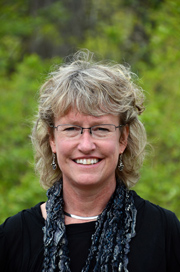As the world remembers the horrific genocide in Rwanda 20 years ago, a Michigan State University scholar is helping survivors tell their stories through a book of poems.
Laura Apol, an award-winning author and associate professor of education at MSU, wrote “Requiem, Rwanda” based on a series of workshops she organized for citizens in Rwanda to promote healing through writing, and her own experiences learning about the tragic events.
April 2014 marks 20 years since approximately 1 million Tutsi and politically moderate Hutu were murdered in Rwanda over the course of 100 days. This week, Apol is attending the Kigali International Forum on Genocide held in Kigali, Rwanda. The forum is a chance to assess responses to the tragedy and discuss enduring challenges of justice, education and reconstruction with experts from around the world.

A collection of poems by Michigan State University education professor Laura Apol, “Requiem, Rwanda,” is forthcoming from MSU Press. Image credit: Michigan State University
“I initially came to Rwanda to facilitate healing for others, but as I learned more about the country and the history of the country, I had my own healing to do,” said Apol, who says writing can help others “witness” parts of history.

“I want my poems to convey the human side of genocide and recovery, and to provide a deeper sense of Rwanda, post-genocide,” says MSU’s Laura Apol. “Ultimately I want the poems to prompt readers and listeners to action.” Image credit: Michigan State University
“I want my poems to convey the human side of genocide and recovery, and to provide a deeper sense of Rwanda, post-genocide. Ultimately I want the poems to prompt readers and listeners to action.”
Apol’s international outreach work in Rwanda began 10 years ago. In 2006, she led the therapeutic workshops with a team of U.S. and Rwandan colleagues, helping survivors use writing as a way to tell their stories and heal through the writing process.
Emery Rutagonya, a workshop participant, summarized the project in this way: “To ask someone to write is to ask them to stand up. To ask someone to write is to invite them to fight for life.”
Writing also helped survivors preserve the memory of those who died. Writing about her family members, all of whom were killed as she ran, Louise Mukamwezi said, “I had no pictures of my mother or father or brothers, but now I have a picture in my heart.”
When the workshops concluded, Apol returned to Rwanda a number of times to write her own poetry. Those poems will be published by MSU Press in the forthcoming “Requiem, Rwanda,” Apol’s third published collection of poems.
Apol currently is completing a novel-in-poems for adolescents, based on a genocide survivor story, entitled “Tutsi.”
*Source: Michigan State University (Published on April 3, 2014)
